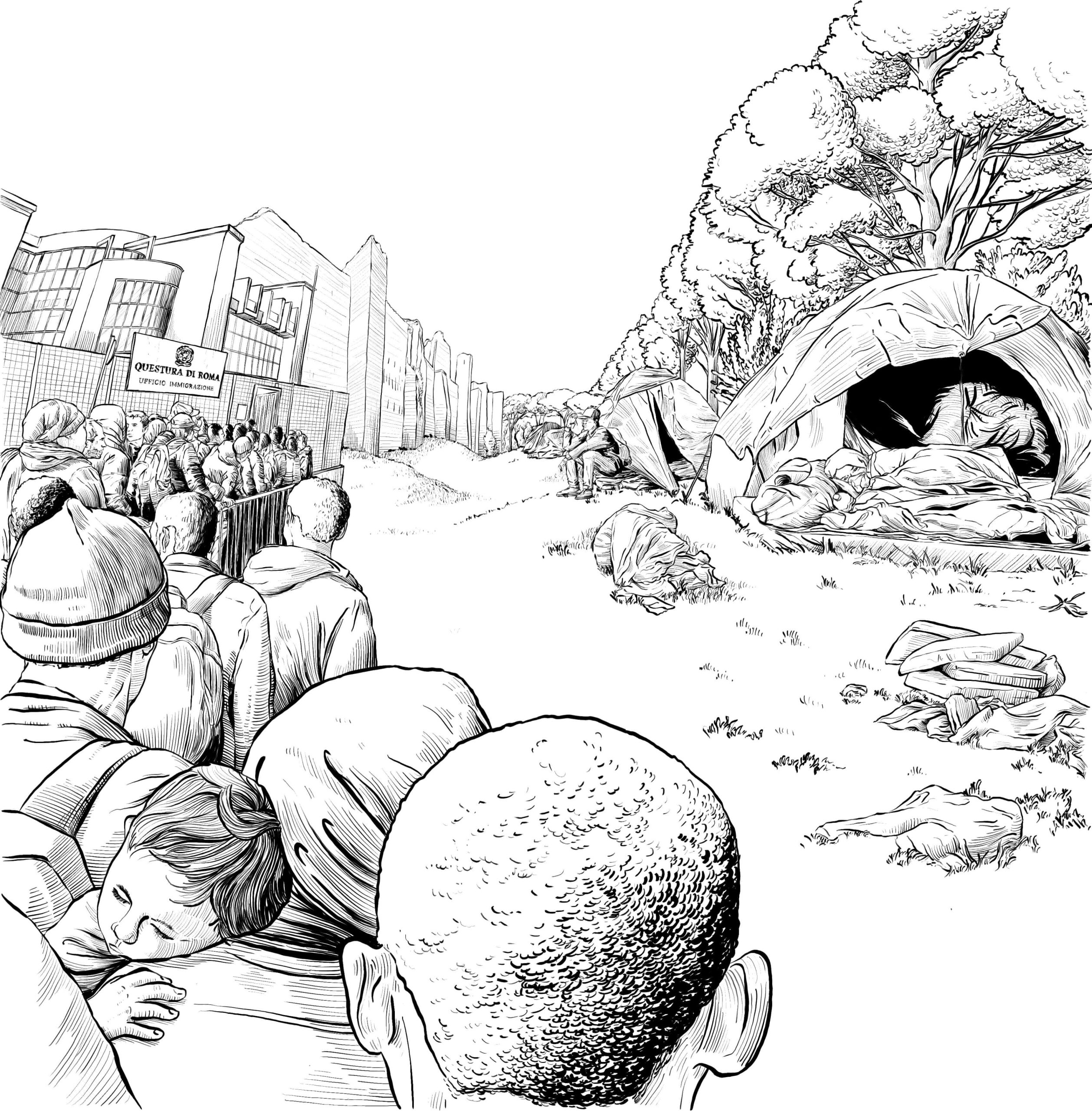Lives on hold
H17:00-18:30
I Pomeriggi series
Entrance: via Liguria 20
H17:00-18:30
I Pomeriggi series
Entrance: via Liguria 20
The event will be held in Italian and English from H17:00 at Istituto Svizzero and online.
To attend in Rome, register here.
To follow the event on Zoom, register here.
I pomeriggi series
I pomeriggi at Istituto Svizzero is a series dedicated to our Fellows. It is an opportunity for the public to learn more about the projects they are working on during this year’s residency.
The event is curated by Michelle von Dach (Roma Calling 2022/2023).
Lives on hold
A look at irregular migration in Italy
During the conference four talks will guide the public through a discussion on the form of migration that tends to be labelled as ‘irregular’. The term ‘irregular’ can vary to ‘illegal’ or ‘undocumented’, and it refers to the people who enter or inhabit on European states without formal authorization. The presence of migrants on state territory is precarious and contested, and migration is invariably intertwined with the presence of inequality and discrimination. During their irregular journeys and even once crossed the borders to Italy, migrants are confronted with several obstacles of different nature: political, bureaucratic, legal and cultural.
Programme:
H17:00-17:10 ― Introduction
Maria Böhmer (Head of Science Istituto Svizzero), Michelle von Dach
H17:10-17:30 ― (online) Martina Tazzioli, Counter-mapping as counter-archive: a genealogy of refugees’ bridled labour at the French-Italian border
H17:30-17:50 – Michelle von Dach, Stuck in Rome: stuckness as physical and existential (im)mobility. An ethnographic study of various forms of waiting
H17:50-18:10 – Barbara Pinelli, Corpo, genere, confini. Prassi e genealogie dei regimi umanitari e di frontiera nelle rotte del Mediterraneo Centrale
H18:10-18:30 ― Discussion
H18:30 ― Aperitif
Biographies:
Barbara Pinelli (University of Roma Tre) is a researcher in Anthropology and co-founder of the Research Centre Escapes. Laboratory of Critical Studies on Forced Migration. She deals with forced migration intersected with gender and feminist perspectives, with a specific focus on border policies and humanitarian regimes in the Mediterranean area. Her main research topics concern forms of physical and moral control of refugees; political violence and gender-based violence, particularly in their perpetuation along mobility trajectories and in places of arrival; types of camps and places of confinement as devices of physical and social detention of refugees; the relationship between vulnerability and transformative agency. She is the author of numerous national and international publications, including Migranti e rifugiate. Antropologia, genere e politica (Raffaello Cortina, 2019), Death and salvation of refugee women on European borders: Race, gender and class of bodies and power (Anthropology Today, 2021), Teleologie dell’emancipazione, senso del sé, trasgressioni. Fratture nella lettura di biografie violate e dell’azione nelle istanze di protezione (Antropologia, 2021).
Martina Tazzioli (Goldsmiths University of London) explores the biopolitical mechanisms by which some subjects are racialised and governed as ‘migrants’, analysing the intertwining of modes of objectivation and subjectivities. More recently, she has investigated the technologization of the border regime and how technologies constitute a battlefield for migrants, states and non-state actors.
Michelle von Dach (University of Zurich) is Doctoral researcher at the University of Zurich and researcher for the Horizon2020 Project HumMingBird. In Italian border zones and for longer time in Rome, she conducted one year ethnographic fieldwork. Her research deals with ‘irregular’ migration in Europe and focuses particularly on the perception of ‘being stuck’ and waiting, on the illegalization of people on European soil and on the reflection of the role of migrant’s agency that is often taken away from state ideologies and humanitarian narratives.
Illustration by Enrico Bachmann
